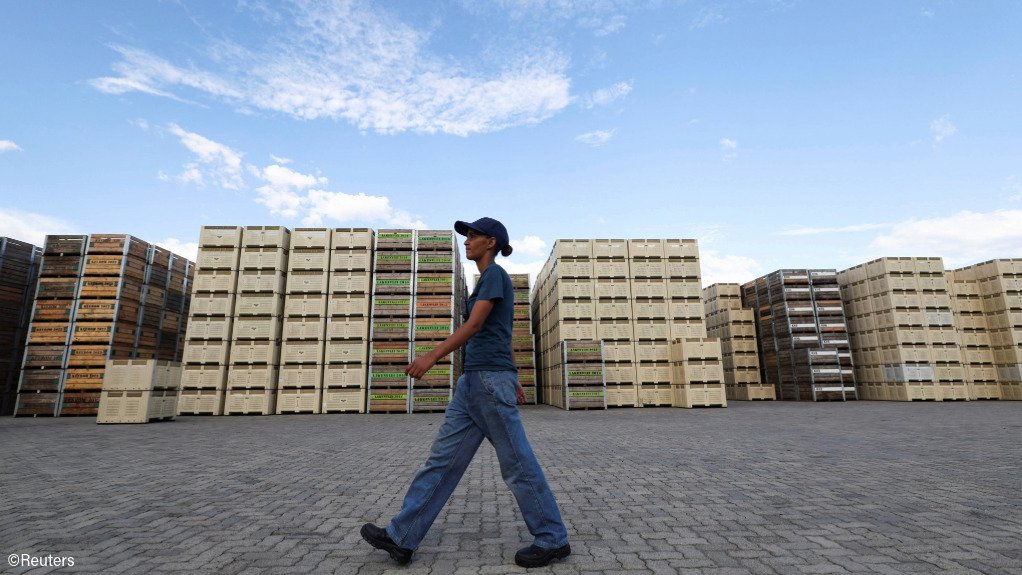South African citrus exporters worried about US tariff impact on jobs, industry growth
South African citrus producers and other participants in the citrus export value chain may need to absorb a portion of the 30% reciprocal tariffs imposed by US President Donald Trump if American consumers “cannot stomach hefty price increases” in the coming months, financial services provider Absa warns in an April 8 media release.
It notes in the latest edition of the ‘Absa AgriTrends’ report that South Africa is a counter seasonal citrus supplier to the US, with the primary exporting months to the US running from July to October. Oranges and mandarins are the main citrus products destined for export to the US.
“With other notable Southern Hemisphere exporters like Chile already sending the bulk of their orange exports – 75% or more – to the US during this period, there is limited capacity from other Southern Hemisphere producers to substitute South African volumes, which become uncompetitive based on the imposed 30% import levy,” says Absa AgriBusiness senior economist Dr Marlene Louw.
“Given the limited capacity for alternative sourcing, we expect the biggest portion of the duty increases to be passed on to the US consumer. However, whether consumers have the capacity and willingness to absorb the full tariff increase remains uncertain.
“It seems likely that exports from other geographies and competition from other fruit types will trigger changes in consumption patterns, and that some portion of the duty impact would need to be absorbed by other participants in the citrus value chain,” says Louw.
She further points out that, in contrast to oranges, South African mandarins supplied into the US from June to October face some competition from Peru and Chile.
While there is limited capacity from Chile to fill a gap left by the possible absence of South African volumes, Peru sends only about half of its mandarins into the US, says Absa.
“Given a more competitive duty – a 10% Liberation Day tariff for Peru – Peruvian volumes could be diverted from destinations such as the EU, into the US market.
“Late mandarin exports from Peru are also likely to benefit from strong expansion in the mandarin area up to 2020, which should now be reaching full production. This could add to alternative volumes [to] South African produce,” says Louw.
Given the different features of these product categories, Absa says the upcoming season will provide valuable lessons on US consumers' ability to absorb higher prices for perishable products and the ability of value chains to divert volumes to alternative jurisdictions.
The group posits that, over the short term, all stakeholders should leverage their relationships to lobby for reduced tariffs that are comparable to other Southern Hemisphere agricultural exporters.
Absa describes this as an “imperative” to retain market share for South African products.
It notes that, in 2024, citrus exports from South Africa to the US amounted to about R1.8-billion. This is 5.4% of the total citrus exports from South Africa.
Recent developments around tariffs imposed by the US and the response by global trading partners suggest that controlled trade based on the rules governed by the World Trade Organisation is disappearing, says Absa.
“To navigate this, value chain players and industry stakeholders will need to enhance their understanding of the law, economics and science that are in play when trade agreements are considered.
“This will likely increase the transaction costs of trading globally but is an imperative to remaining efficient and agile amidst higher uncertainty,” Louw adds.
JOBS ON THE LINE
Meanwhile, the Citrus Growers' Association of Southern Africa (CGA) has warned that the tariffs imposed by the US will hurt South African citrus farms and the rural communities they support.
The CGA is calling on the South African government to prioritise immediate negotiations with the US on tariff reductions or exemptions on citrus, saying this is “urgently needed” to avoid job and revenue losses in the citrus industry, South Africa's largest agricultural export industry.
"While South Africa only exports about 5% to 6% of our citrus to the US, many rural communities in the Western and Northern Cape are heavily dependent on US exports. A prime example of this is Citrusdal, where exports to the US form the economic heart of this vibrant town.
“The severity and immediate nature of the impending tariffs could mean that towns like it now face either increased unemployment or maybe even total economic collapse. There is immense anxiety in our communities," says CGA chairperson and a citrus grower in the Olifants River Valley Gerrit van der Merwe.
He clarifies that about 35 000 jobs are connected to South Africa’s citrus exports to the US in one way or another.
The CGA says the additional 30% tariff will make South African citrus uncompetitive in the US market, noting that the 30% tariff will add $4.25 to the cost per carton of South African citrus in the US.
"There are clear and convincing arguments for why our government must act swiftly and decisively to safeguard citrus," says CGA CEO Boitshoko Ntshabele.
"Citrus is not produced in a factory. South African citrus growers do not compete with US citrus growers. In fact, quite the opposite. Our high-quality produce sustains consumer interest when US local citrus is out of season, eventually benefitting US growers when we hand over at the end of our season," he explains.
"Citrus also plays an important role in the healthy diet of Americans. Tariffs on seasonal fresh produce will most likely increase prices for the American consumer," Ntshabele continues.
"Citrus should be on the White House's exemption list. It is seasonal, and it supports both US health and the US citrus industry, while it helps to keep food inflation down," adds Van der Merwe.
The CGA argues that US demand for South Africa's “quality citrus” is clearly shown by the increase in exports to the US since 2017.
It notes that the amount of citrus exported to the US has almost doubled since then, to over 6.5-million cartons. It is also estimated that 20 000 jobs up and down the supply chain in the US are linked to US-South African citrus trade.
Although only citrus from the Western and Northern Cape are exported to the US because of outdated phytosanitary (plant health) rules, the CGA says “extreme urgency” is needed to address the situation, because, when the tariffs come into effect, large amounts of the citrus destined for the US will be redirected to other markets.
The CGA says this could destabilise these markets, with a knock-on effect on the entire Southern African citrus industry.
"The US volumes cannot be easily absorbed elsewhere at such short notice," explains Ntshabele.
"Also, we already face very steep tariffs with exports to promising markets like India and China. We appreciate government’s announcement that it will intensify efforts to diversify export destinations – targeting Asia, Europe and the Middle East, to name a few – but we need to retain current markets as well, as our citrus production is projected to increase substantially in the next few years," he continues.
Ntshabele highlights that an increase in exports to the US was one of the cornerstones of the CGA's target to create 100 000 additional jobs by 2032.
"We are now looking at a potential situation wherein not only will we be facing job losses, but we also lose the potential of serious job growth – a double tragedy.
“The South African government should urgently work towards a new trade agreement with the US, but such agreements can take years, and we do not currently have the time. The 2025 season has already arrived, and the produce is making its way to the ports," he concludes.
Comments
Press Office
Announcements
What's On
Subscribe to improve your user experience...
Option 1 (equivalent of R125 a month):
Receive a weekly copy of Creamer Media's Engineering News & Mining Weekly magazine
(print copy for those in South Africa and e-magazine for those outside of South Africa)
Receive daily email newsletters
Access to full search results
Access archive of magazine back copies
Access to Projects in Progress
Access to ONE Research Report of your choice in PDF format
Option 2 (equivalent of R375 a month):
All benefits from Option 1
PLUS
Access to Creamer Media's Research Channel Africa for ALL Research Reports, in PDF format, on various industrial and mining sectors
including Electricity; Water; Energy Transition; Hydrogen; Roads, Rail and Ports; Coal; Gold; Platinum; Battery Metals; etc.
Already a subscriber?
Forgotten your password?
Receive weekly copy of Creamer Media's Engineering News & Mining Weekly magazine (print copy for those in South Africa and e-magazine for those outside of South Africa)
➕
Recieve daily email newsletters
➕
Access to full search results
➕
Access archive of magazine back copies
➕
Access to Projects in Progress
➕
Access to ONE Research Report of your choice in PDF format
RESEARCH CHANNEL AFRICA
R4500 (equivalent of R375 a month)
SUBSCRIBEAll benefits from Option 1
➕
Access to Creamer Media's Research Channel Africa for ALL Research Reports on various industrial and mining sectors, in PDF format, including on:
Electricity
➕
Water
➕
Energy Transition
➕
Hydrogen
➕
Roads, Rail and Ports
➕
Coal
➕
Gold
➕
Platinum
➕
Battery Metals
➕
etc.
Receive all benefits from Option 1 or Option 2 delivered to numerous people at your company
➕
Multiple User names and Passwords for simultaneous log-ins
➕
Intranet integration access to all in your organisation























